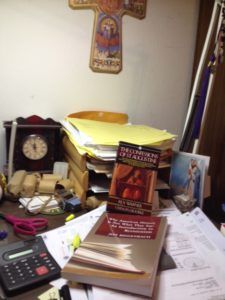Monday

Miscellaneous Rambling: Blah, Books, Wikipedia, and Charitable Phone Solicitations
Welcome to the blah time of year. Truth is, I don't mind it. I enjoy the forced seclusion and quiet time. My waistline could use a break from the social commitments, and my leisurely study pursuits will make use of stretches of down time. * * * * * * * Recently-acquired books that I'm reading during this period: Russell Kirk: American Conservative, by Bradley Birzer; Living the Gospel without Compromise, by Catherine Doherty; The Father of Spin: Edward L. Bernays and the Birth of Public Relations, by Larry Tye. A scholar, a saint, and a scoundrel. * * * * * * * Best neologism of the young year: Wikinius: "A person who claims to be an expert in a certain topic when it's clear they've only read the Wikipedia entry on it." * * * * * * * That being said, if you fully absorbed a detailed Wikipedia entry (say, the one about the Roman Empire), you would certainly be knowledgeable, even if your knowledge is subject to the occasional gross error inputted by a troll ("Did you know Caligula repented and became one of the first Christians?"). And I would think that if you then absorbed all the Wikipedia pages linked in the article, you would be highly knowledgeable. If you then read all the materials referenced in the footnotes (581 in the Roman Empire entry), I think you would start to approach expert status. And if you then read the materials undoubtedly referenced in those 581 sources, you would attain expert status. * * * * * * * Am I stating the obvious? Perhaps, but Wikipedia doesn't get nearly the respect it deserves. It's a tertiary research source and a dang good one. Treat it as a great tertiary source with that one potential flaw (the mischievous troll). * * * * * * * I'm sure I've mentioned it before, but the existence of thousands of "amateur scholars" on a subject who are vigilant to kill trolls on their beloved Wikipedia entries arguably do as good or a better job than just one or two scholars working on a traditional encyclopedia entry. “There has been lots of research on the accuracy of Wikipedia, and the results are mixed–some studies show it is just as good as the experts, others show [that] Wikipedia is not accurate at all.” Forbes. * * * * * * * Not accurate at all? I find that very hard to believe. There are a few topics in which I am pretty knowledgeable. Law, for instance, especially when it comes to business, real estate, taxation, and other transactional matters. When a client wants a good explanation about a general legal concept but doesn't want to pay me hundreds of dollars to type one up, I often scan the Wikipedia entry and, if it's basically accurate, send it to the client as a general reference (with the obvious caveats, of course). Only once have I read a Wikipedia entry for this purpose and decided not to send it (and even then, it wasn't because the entry was flawed, but because the general concept as explained in Wikipedia simply didn't fit its application in Michigan). * * * * * * * Anyone else get absolutely deluged with nonprofit telephone solicitations this last December? I finally picked up one of the "Toll Free" calls. It was a Catholic international charity we support. I basically said, "Look, I think you do a lot of good and I know it's not personally your fault, but your incessant calling is rude." Marie and I are now in the process of eliminating all Catholic charities who do not affirm that they will not sell our phone number and will not call us for further donations. If you know of worthy charities who fit this criteria, especially international charities where my money will help the poorest of the poor, please let me know.
